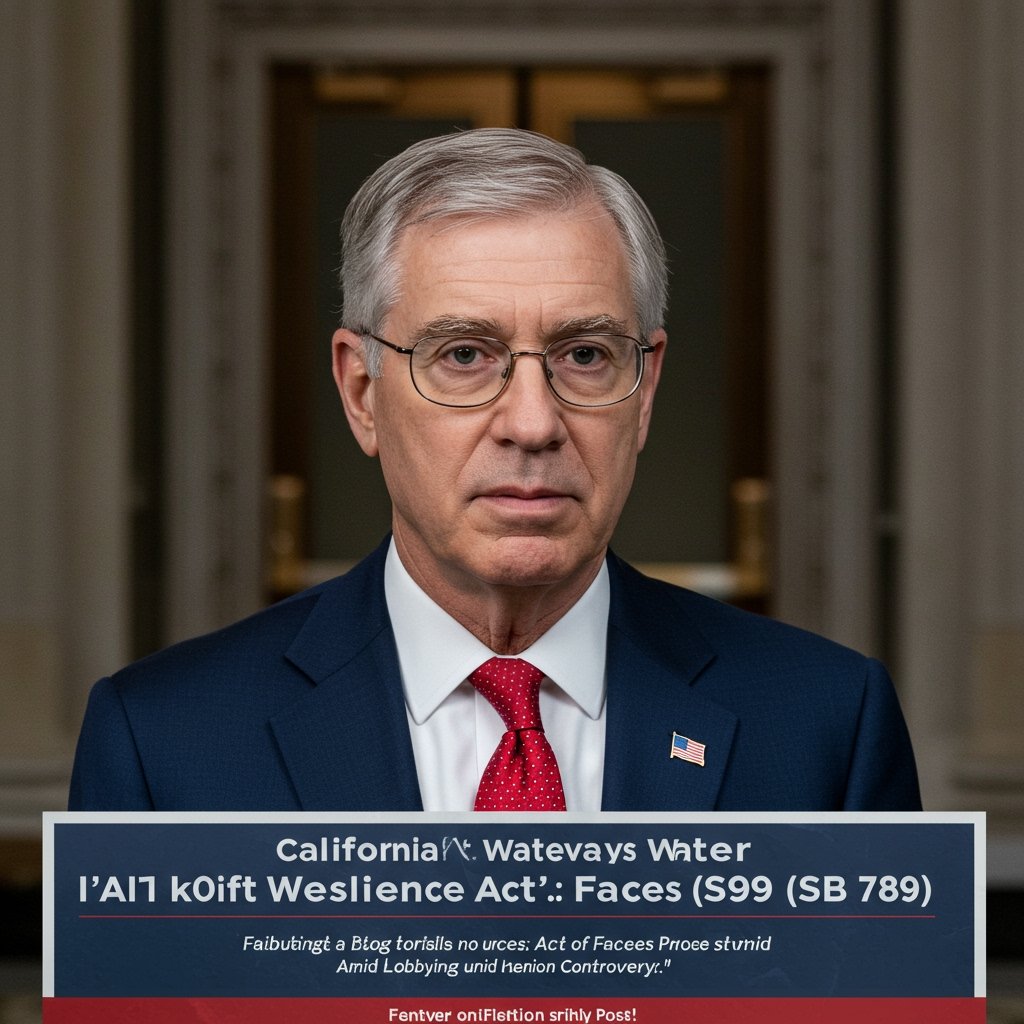Ethics Investigation Launched into SB 789 Lobbying Concerns
SACRAMENTO, CA – The California State Ethics Commission announced on February 7, 2025, it has initiated a formal investigation into potential improper lobbying activities surrounding the recently enacted “Water Resilience and Adaptation Act”, widely known as SB 789. This significant legislative measure, designed to address California’s pressing water infrastructure needs and enhance resilience against climate change impacts, was signed into law with a projected investment of $15 billion over the next five years. The probe casts a shadow over the implementation of this landmark bill, focusing on allegations that campaign contributions from specific corporate entities may have influenced key provisions within the legislation or potential contracting processes.
The commission’s announcement follows a period of growing speculation regarding the influence of powerful industry groups on the crafting of SB 789. Sources familiar with the investigation, speaking on condition of anonymity, indicate that the inquiry is specifically examining the nature and timing of campaign contributions made by executives and political action committees associated with prominent firms, including AgriCorp Holdings and WestCoast Development Group. These companies have significant interests in sectors expected to benefit from the substantial investments mandated by SB 789, such as large-scale water infrastructure projects, agricultural water efficiency initiatives, and climate adaptation construction.
Background: The Water Resilience and Adaptation Act
SB 789, the “Water Resilience and Adaptation Act”, is California’s most ambitious legislative effort in recent years to tackle the complex challenges posed by drought, shifting precipitation patterns, and the increasing strain on water resources due to climate change and population growth. The bill allocates $15 billion over a five-year period for a diverse portfolio of projects. These include upgrades to aging canals and reservoirs, development of new water recycling facilities, implementation of advanced water conservation technologies in agriculture and urban areas, habitat restoration for vital water ecosystems, and measures to enhance groundwater recharge.
Supporters of SB 789 have hailed it as a critical investment in California’s future, essential for ensuring water security for its vast agricultural sector, growing urban centers, and fragile natural environments. They argue that the scale of funding is necessary to build resilience against future climate shocks and ensure a reliable water supply in the face of unpredictable weather extremes.
Allegations and Key Players Under Scrutiny
The California State Ethics Commission‘s investigation is centered on allegations that the substantial financial contributions made by individuals and PACs linked to companies like AgriCorp Holdings and WestCoast Development Group may not have been merely expressions of political support. Instead, the probe aims to determine if these contributions constituted improper lobbying intended to secure favorable treatment within SB 789 or subsequent state contracts awarded under its authority. Specifically, sources suggest the commission is looking into whether contributions potentially influenced language in the bill that could give certain types of projects or specific contractors an advantage in securing state funds or bypass certain regulatory hurdles.
AgriCorp Holdings, a major player in California’s agribusiness sector, has a vested interest in the components of SB 789 related to agricultural water infrastructure, efficiency improvements, and water storage. WestCoast Development Group, a large construction and development firm, stands to benefit significantly from contracts related to building new infrastructure like pipelines, treatment plants, and storage facilities funded by the act.
While campaign contributions are a legal and common part of the political process, ethics laws prohibit quid pro quo arrangements where contributions are directly exchanged for legislative favors or government contracts. The commission’s task is to meticulously trace contributions, communications, and legislative actions to determine if such improper links exist.
Implications and Next Steps
The launch of the California State Ethics Commission‘s investigation on February 7, 2025, introduces uncertainty into the rollout of SB 789. While the investigation proceeds, it could potentially slow down the allocation of funds, increase scrutiny on initial project proposals, and erode public confidence in the integrity of the process governing this vital $15 billion investment. If the investigation uncovers evidence of wrongdoing, it could lead to fines, enforcement actions, and potentially calls for legislative reform regarding lobbying and campaign finance disclosure.
The commission’s investigation is expected to be thorough, involving subpoenas for documents, interviews with lobbyists, legislators, state officials, and corporate executives. The timeline for such investigations can vary, but the high profile of SB 789 and the significant amount of money involved suggest it will be a priority for the commission.
Official Responses
In response to the announced probe, Governor Gavin Newsom‘s office has publicly endorsed the investigation. A statement from the Governor’s office indicated strong support for a “thorough and impartial investigation into the allegations,” emphasizing the administration’s commitment to transparency and ensuring that the $15 billion allocated by SB 789 is used effectively and ethically to benefit all Californians. Representatives for AgriCorp Holdings and WestCoast Development Group have yet to issue detailed public statements regarding the specifics of the investigation, though sources close to the companies maintain that their contributions were lawful and did not constitute improper lobbying.
The investigation into SB 789 serves as a potent reminder of the ongoing tensions between necessary industry engagement in the legislative process and the critical need to safeguard against undue influence and maintain public trust in government actions, particularly concerning massive public investments like the $15 billion designated for California’s water resilience.


















